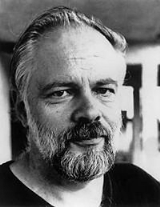Philip Kindred Dick was an American novelist, short story writer and essayist whose published work is almost entirely in the science fiction genre. Dick explored sociological, political and
metaphysicalMetaphysics is a branch of philosophy concerned with explaining the fundamental nature of being and the world, although the term is not easily defined. Traditionally, metaphysics attempts to answer two basic questions in the broadest possible terms:...
themes in novels dominated by
monopolisticA monopoly exists when a specific person or enterprise is the only supplier of a particular commodity...
corporations,
authoritarian governmentsAuthoritarianism is a form of social organization characterized by submission to authority. It is usually opposed to individualism and democracy...
and altered states. In his later works Dick's thematic focus strongly reflected his personal interest in metaphysics and
theologyTheology is the systematic and rational study of religion and its influences and of the nature of religious truths, or the learned profession acquired by completing specialized training in religious studies, usually at a university or school of divinity or seminary.-Definition:Augustine of Hippo...
. He often drew upon his own life experiences in addressing the nature of
drug abuseSubstance abuse, also known as drug abuse, refers to a maladaptive pattern of use of a substance that is not considered dependent. The term "drug abuse" does not exclude dependency, but is otherwise used in a similar manner in nonmedical contexts...
,
paranoiaParanoia [] is a thought process believed to be heavily influenced by anxiety or fear, often to the point of irrationality and delusion. Paranoid thinking typically includes persecutory beliefs, or beliefs of conspiracy concerning a perceived threat towards oneself...
and
schizophreniaSchizophrenia is a mental disorder characterized by a disintegration of thought processes and of emotional responsiveness. It most commonly manifests itself as auditory hallucinations, paranoid or bizarre delusions, or disorganized speech and thinking, and it is accompanied by significant social...
, and
transcendentalIn philosophy, the adjective transcendental and the noun transcendence convey the basic ground concept from the word's literal meaning , of climbing or going beyond, albeit with varying connotations in its different historical and cultural stages...
experiences in novels such as
A Scanner DarklyA Scanner Darkly is a BSFA Award winning 1977 science fiction novel by American writer Philip K. Dick. The semi-autobiographical story is set in a dystopian Orange County, California, in the then-future of June 1994...
and
VALISVALIS is a 1981 science fiction novel by Philip K. Dick. The title is an acronym for Vast Active Living Intelligence System, Dick's gnostic vision of one aspect of God....
.
The novel
The Man in the High CastleThe Man in the High Castle is a science fiction alternate history novel by American writer Philip K. Dick. It won a Hugo Award in 1963 and has since been translated into many languages....
bridged the genres of alternate history and science fiction, earning Dick a
Hugo Award for Best NovelThe Hugo Awards are given every year by the World Science Fiction Society for the best science fiction or fantasy works and achievements of the previous year. The award is named after Hugo Gernsback, the founder of the pioneering science fiction magazine Amazing Stories, and was once officially...
in 1963.

![]()
![]()
![]()
![]()

